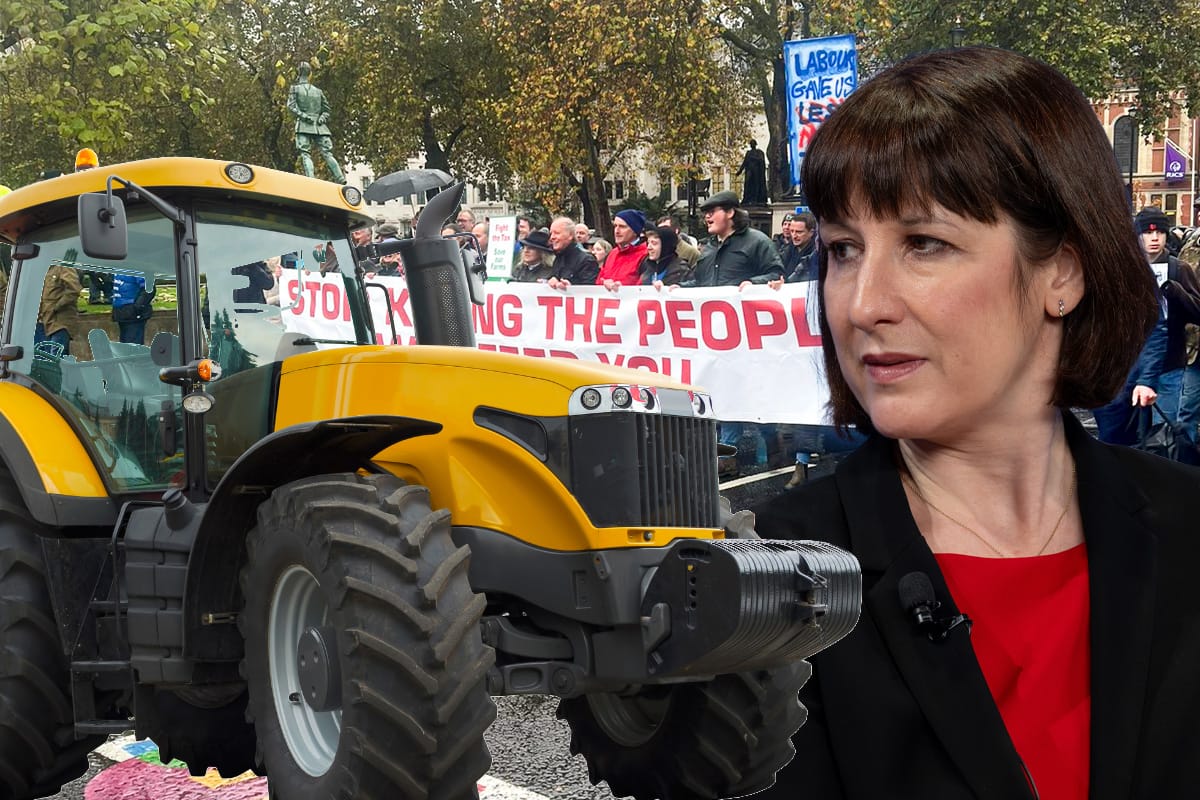Just weeks ago, Chancellor Rachel Reeves unveiled the new Labour government’s inaugural Budget.
With these economic proposals, the Labour leaders promised to restore stability. Instead, they have provoked a crisis in the countryside.
In particular, changes to inheritance tax rules have angered many farmers. Consequently, approximately 20,000 descended on Westminster yesterday to protest these measures.
Can any one spot @RachelReevesMP ? #stopthefamilyfarmtax #wejustwanttofeedyou pic.twitter.com/3l5FU20WrQ
— Olly harrison 🥛🍔🌱AccidentalYoutuber (@agricontract) November 19, 2024
Labour ministers assert that only the largest estates will be impacted. But the National Farmers Union (NFU) has dismissed this claim as inaccurate, and has vowed to oppose what it has dubbed the “Family Farm Tax”.
As ever, meanwhile, reactionary opportunists have seized upon this discontent to push their own interests and agendas.
What is really going on here? And what demands should communists raise when it comes to the agricultural sector and those working in it?
How many will be affected?
The proposed rule change introduces an effective inheritance tax rate of 20 percent on agricultural assets valued between £1-3 million, depending on circumstances. According to the government’s calculations, this is expected to impact approximately 500 estates.
The significance of this figure is obscured, however, by the fact that it represents the number of inheritances received annually, rather than the total number of farms that could be impacted over time.
Furthermore, this estimate relies on broad Treasury projections. But government officials themselves acknowledge that they need to look into possible inaccuracies and discrepancies.
The NFU, for example, has pointed to more detailed data from the Department for Environment, Food and Rural Affairs (Defra), which indicates that over two-thirds of farms could potentially be affected by these tax changes.
Who is being targeted?
Confusion has also arisen due to the ostensible target of Labour’s proposals: large landowners.
After all, few are likely to sympathise with billionaires who have invested in farmland in order to exploit inheritance tax relief schemes.
Millionaires like Jeremy Clarkson who are not from farming backgrounds, for example, have openly admitted that they bought agricultural land to take advantage of such tax breaks.
And statistics show that private and institutional investors – alongside wealthy, Clarkson-esque ‘lifestyle buyers’ – account for well over half of farm purchases in recent years.
The government’s claim that only ‘500 estates’ will be affected is based on this half-truth, with Labour cynically painting their policy as one aimed squarely at the super-rich.
For starters, however, everyone knows that such well-heeled folk have armies of accountants, advisors, and lawyers at their disposal, adept at exploiting alternative loopholes to safeguard their assets. This is precisely why many invested in farmland to begin with.
Britain’s wealthiest, therefore, won’t be losing much sleep over this latest move.
By contrast, in the words of one farmer interviewed by Financial Times: “There are thousands of farmers who didn’t sleep last night because they are worrying that their children are going to be in a horrible situation if they pop their clogs.”
This farmer owns a dairy farm valued at £2 million, and will therefore be hit by Labour’s new tax measures. Yet the annual profit they bring in is only £35,000, shared between two brothers. If he were to pass away, his heirs would need to deal with a six-digit tax bill, payable over a decade – a significant financial strain.
Great to see former NFU Student & Young Farmer Ambassador @rebeccaa_wilson on @bbclaurak this morning putting key questions about her future to Chancellor @RachelReevesMP following the #Budget announcements on APR and BPR. #BackBritishFarming
— National Farmers’ Union (@NFUtweets) November 3, 2024
“They say they’re going after landed industrialists who employ people like me to farm their land,” shared one dairy, beef, and arable farmer from Somerset on yesterday’s protest, “but [the industrialists] have already sewn it all up in offshore funds and trusts.”
The government’s latest proposals, he stated, would place heavy debts on him and his family. He therefore doubted whether they would be able to bear the financial burden of the new duties.
“The big, big ones can afford it,” another young farmer added. “They are raking in millions. But farms like us – we have no money as it is.”
Imagine there’ll be a government press release along later to explain that all of these folk are the landed gentry. #StoptheFamilyFarmTax #WeJustWantToFeedYou pic.twitter.com/wDMrOtWZlz
— James Clark (@OxonJames) November 19, 2024
How did we get here?
The truth is that the proposed changes to inheritance tax, for many farmers, are merely the final straw in a long-standing crisis within UK agriculture.
The so-called free market has consistently squeezed small- and medium-sized farmers, as well as farmer-tenants and agricultural workers.
Since 2019, farming costs have surged: for pig farming by 54 percent; cattle by 44 percent; and cereal by 43 percent. Subsidies that farmers receive, meanwhile, have declined since Brexit.
The loss of income has been even more dramatic. Cereal farmers have experienced a 73 percent reduction in income, while dairy farmers saw their earnings fall by 68 percent last year.
Small and middle farmers, in this respect, are often asset-rich but cash-poor. 25 percent of UK farmers fail to turn a profit.
Their land may hold significant value. But it is typically passed down to future generations, rather than sold in order to realise this potential wealth.
Ironically, Labour’s proposed tax reform could trigger land sell-offs, likely to be exploited by the super-rich. This would not only lead to job losses for thousands of agricultural workers, but could also jeopardise domestic food production, driving up supermarket prices.
Which way forward?
All of this highlights how hollow Labour’s slogan of “taxing those with the broadest shoulders” is in practice.
In 2023 @Keir_Starmer looked farmers in the eye & said he knew what losing a farm meant.
Farmers believed him.
After today’s budget they don’t believe him any more.#BackBritishFarming pic.twitter.com/Q1EI0i2sOA
— National Farmers’ Union (@NFUtweets) October 30, 2024
Whether it be increases to employers’ national insurance contributions or taxes on big landowners, the wealthy will always find ways to preserve their profits.
Meanwhile, it is the working class, the poor, and the vulnerable – alongside squeezed, formerly middle-class layers – who bear the brunt of the hardship.
Starmer and co. say that their surprise tax raid on farmers is needed to fund the fixing of Britain’s crumbling public services, upon which those in both the countryside and the cities rely. But this is smoke and mirrors.
Councils are bankrupt, schools are falling down, and roads are ridden with pot-holes because of years of austerity and decades of decay.
The capitalists and their system are to blame for this dire situation. And it is they – not ordinary families, whether they be urban or rural – who should be made to pay.
What is needed is to expropriate the billionaires, bankers, and mega-landowners, with their hoarded wealth used to invest in decent services, utilities, and infrastructure for all.
Only on this basis can struggling communities – including those who are reliant on agriculture – be supported, instead of becoming prey for wealthy investors and corporate vultures.
What next?
In the absence of such an alternative, there is no shortage of opportunists and demagogues to fill the vacuum.
The reactionary right wing has rushed to take advantage of the farmers’ anger and Labour’s stumble, with figures like Kemi Badenoch and Nigel Farage cynically rushing to the rescue of their traditional voter base.
The big landowners are also hoping to use the genuine plight of poorer farmers to scrap the tax.
But these ladies and gentlemen are only joining the protests for their own ends. And many farmers know this.
The truth is that most agricultural workers, farmer-tenants, and smaller farmers – like much of the population – are fed up with all politicians, as well as with the big corporations in the food industry.
The Tory vote in rural areas totally collapsed at the last election, following years of decline for the agricultural sector under successive Conservative governments.
Illusions in capitalism’s rotten status quo – including the politicians and institutions that uphold it – are being burnt away across the board, including in the countryside. But nobody is offering a way forward, out of the present impasse.
The government could yet seek to compromise with the farmers, in an effort to quell the protests.
If they don’t, there is the potential for tensions to escalate into militant action – as seen with the uprisings of farmers in Wales and Europe earlier this year, when tractors halted motorway traffic and blockaded government buildings.
Such action could serve as inspiration to workers and youth who are also being crushed by the crisis of capitalism, but who are currently being offered no lead.
So watch this space. For now, it may be Barbour-clad farmers taking to Britain’s streets. But tomorrow, it will be the workers of the world.
Letter: A farmer’s perspective
Spencer Upton, Cheltenham
During a recent sale of The Communist on Cheltenham high street, I spoke to a farmer in his 40s who had taken on the family farm. This includes around 1000 acres, 1500 beef cattle, and a large number of sheep.
This medium-sized (but still fairly large) farm was run by just two people – himself and his partner – working 60-70 hours a week.
“Whatever you do, don’t go into farming,” he said, as he told me how competition and low prices drove ever-increasing capital investment alongside ever-slimmer margins.
He was looking into investing in a bioethanol powered tractor, and into producing electricity with a biogas generator.
He had taken the farm over from his father, for reasons that were not profit-motivated.
But many of his generation have not done the same, leading to the swallowing up of small- and medium-sized farms into larger farming structures, managed by corporate contractors.
“Why can’t the government get the farmers around the table?” he asked rhetorically. “Why can’t we come up with a solution?”
This is a common frustration of farmers, who see their essential role as food producers being made secondary to the perpetuation of the unplanned and unregulated production and trade of agricultural commodities.
The lack of planning leads to those that produce food – and who also manage the land – being motivated by profitability, and not by the provision of nutritious food to all and the protection of our soil, water, and wildlife.
Letter: For food, not profit
William Gedling, Manchester
As tractors rolled into London, all the capitalist politicians suddenly rediscovered their rural roots. Reform MPs quickly darned their flat caps and Barbour jackets, and Starmer further diversified his household’s occupations portfolio to include his first job on a farm.
Likewise, the media flocked to the farmer’s so-called representatives: Top Gear has-been Jeremy Clarkson and composer ‘Lord’ Andrew Lloyd Webber – who own a combined 6,000 acres.
With all the mention of million-pound assets, it isn’t surprising why most workers feel alienated or confused by these protests, when we can barely afford to own a car – let alone a tractor.
However, for the farmer who has recently taken on a second job to pay their bills, and whose mortgages repayments and prices are being ramped up by big banks and agriculture monopolies, they are equally alienated from these rich ‘farmers’ and establishment politicians trying to piggyback on their protests.
Without a revolutionary programme and leadership, however, the struggles of farmers and workers risk being divided and portrayed as at odds with each other by the establishment and the media.
We say:
- No trust in the capitalist politicians like Farage and Badenoch!
- Expropriate the big landowners and monopolies!
- Invest in our infrastructure and agriculture!
- For food, not profit!






